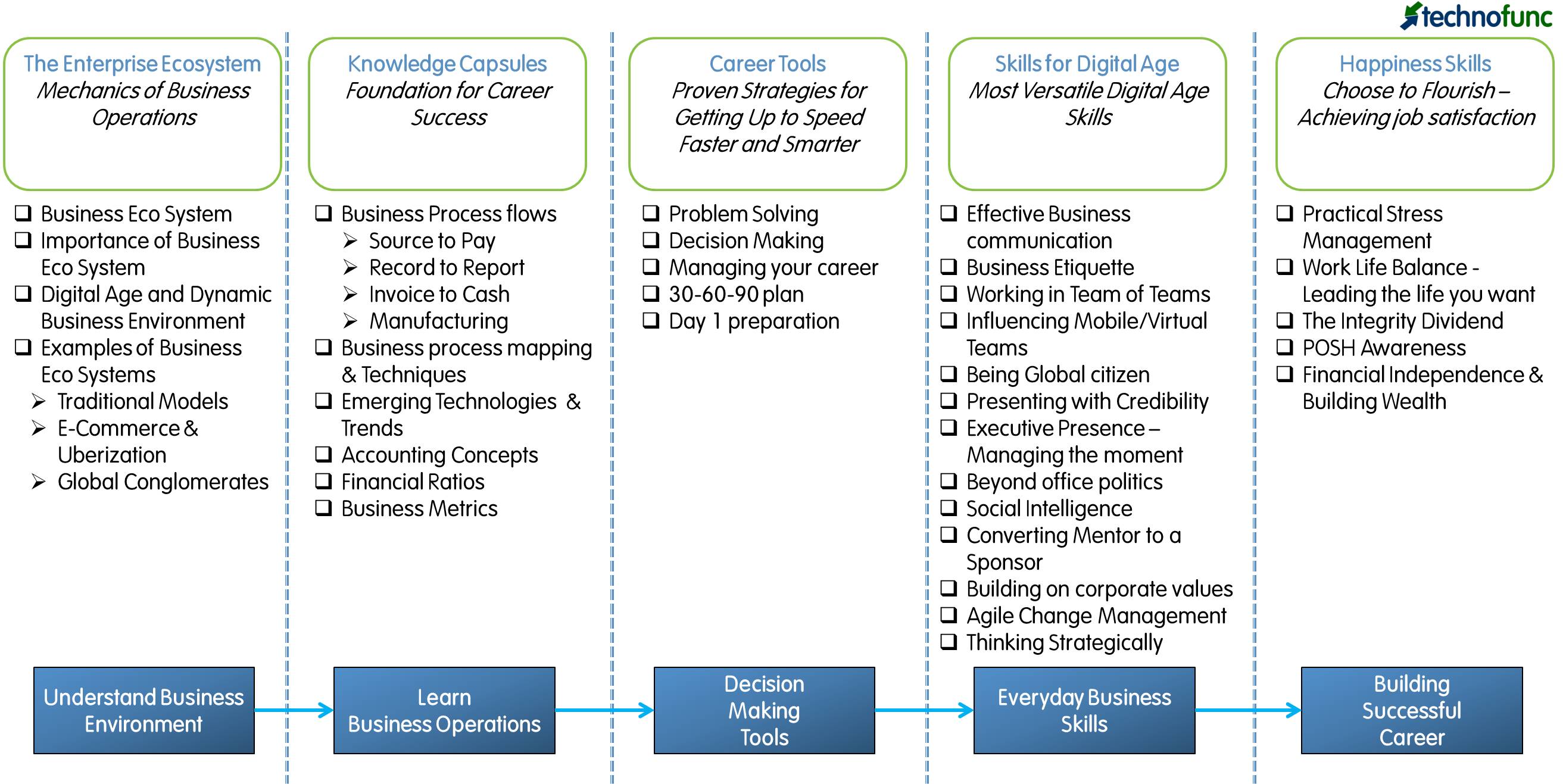- Home
- Business Processes
- Industry Knowledge
- Aerospace Industry
- Automotive Industry
- Banking Domain
- BFSI Industry
- Consumer/ FMCG Industry
- Chemicals Industry
- Engineering & Construction
- Energy Industry
- Education Domain
- Finance Domain
- Hospitality Domain
- Healthcare Industry
- Insurance Domain
- Retail Industry
- Travel and Tourism Domain
- Telecom Industry
- Leadership Skills
- eLearning
- Home
- Leadership
- Leadership & Management
- Top Management Skills
Top Management Skills
In today's business world, proficiency in management skills is essential for career growth and success. Managerial skills can be defined as attributes or abilities that are essential for every leader and manager to succeed and fulfill specific tasks expected from them by the organization.
Role of Managers
Management makes human efforts more productive. It brings better projects, plants, equipment, officers, products, services, and human relations to our society. Improvements and progress are constant watchwords. The roles and responsibilities of a manager include performing functions like planning, organizing, staffing, directing, and controlling. A manager is responsible for managing a department or team and handling several administrative tasks. Managers need to administer and coordinate resources effectively and efficiently to ensure their usage in the successful accomplishment of the business objectives.
A manager's role starts with understanding the business objectives and performs the goal setting for his department and team. He needs to mobilize and utilize the resources to accomplish the desired results within predetermined constraints of time, effort, and cost. The manager administers the day to day management of effective utilization of resources like men, materials, machines, methods, money, and markets.
What are Management Skills?
Managers to be successful have to know how to do things efficiently and effectively, so they are indeed a unique scientific and artistic combination in practice. Management skills can be defined as the set of abilities and efforts applied by the managers in order to effectively achieve the organizational goals.
To accomplish all these tasks a manager needs proficiency in many skill areas like great communication, time management, organizational awareness, problem-solving, decision making, and creativity clubbed with other essential leadership skills.
The Top Management Skills You Need
You may want to work on the following skills for enhancing your success, more particularly when you get into a managerial position.
Understanding of Management Concepts
As a manager, you are responsible for controlling and managing your team in order to accomplish your business goals. You also need to refine your Leadership & Management Skills in order to motivate, influence, and enable other employees to make a meaningful contribution to the success of your organization. A strong foundation on Leadership Theories and understanding of various Leadership Styles will help you easily fulfill your responsibility as a manager.
Project Leadership
Towards realizing the organizational or project/program goals you need to have strong project management skills. Know the goals of your organization, understand the project scope and objectives, build an effective team by selecting the right subordinates, and delegate work by letting subordinates decide issues within their respective spheres of operation and check to ensure that the results being obtained are satisfactory. Planning is the process of setting goals, developing strategies, and outlining tasks and schedules to accomplish organizational goals. A plan well laid is half the job done.

Team Leadership
A team leader is someone who provides guidance, instruction, direction, and leadership to a group of individuals for the purpose of achieving the desired objectives. The team leader monitors the quantitative and qualitative achievements of the team and reports results. As a manager, you should select your group members carefully and continuously motivate them and try to minimize the conflicts among them. Strive to attain effective interpersonal relationships. Visit the section on team leadership to learn more about team management. Delegation is the assignment of certain duties and responsibilities by the manager to the subordinates. However, the manager still remains accountable for the work delegated.
Communication Skills
Communication is an act of sharing ideas and information. There are three types of communication written, oral and gestural. A manager should focus on improving his communication skills as well as human relations. One can strengthen human relations by speaking and listening effectively and trying to examine the situations from the other person's viewpoint.
Creativity Tools
Creativity can be defined as looking where all have looked but seeing what no one else has seen. Creativity is the art of doing things in a different way that leads to new and unexpectedly better results. Learn to develop creative solutions to business problems using Creativity Tools.
Decision Making & Problem Solving
Problem-solving and decision-making are important skills for business and life. Problem-solving and decision-making are closely linked, Problem solving often involves decision making. Being able to make decisions and solve problems effectively is necessary for every manager to produce end results.
Strategy Tools
There is no doubt that strategic management tools and techniques are important parts of the manager's day to day life. The manager needs to participate in the strategic management process and perform analysis and planning. A manager should view management as the opportunity to set strategic direction by influencing other people favorably and should also evaluate what’s achieved and, if necessary, take remedial action. Managers should know the business strategy and work towards making a business unique and successful.
Stress Management
Effective stress management helps the manager to effectively deal with organizational and personal stress. Stress management tools help you to be happier, healthier, and more productive. The ultimate goal is a balanced life, with time for work, relationships, relaxation, and fun. Express personal feelings and understand the feelings of others and look for the best in others. Make sure each group member is assigned the work best suited for that person and encourage members to assume responsibility.
Change Management
Organizations need to change to stay relevant. Change management strategy is critical to not only humanizing change but making it last. Managers act as agents who cope with change and bring about change for the betterment of the organization.
Time Management
Time Management is more than just managing time. It is about controlling the use of the most valuable - and undervalued - resource. It is managing oneself in relation to time. It is setting priorities and taking charge of the situation and time utilization. To improve time efficiency managers should spend time on matters that are really important and plan and follow through on programs.
Career Management
Management offers abundant opportunities. The choice of careers is steadily broadening and covers a wide range of talent and ability. Every major activity in every organization involves the management of personnel. Whether you become an academic or an administrator in an organization or a worker or a field functionary at any level in any field, you need to focus on your career management yourself. Managers are also responsible for providing career direction to their team members.
The concepts and skills discussed throughout our website will be useful to you to adapt them to your work situations for your effective functioning and organizational management or administration.
For yourself always set high standards for proposed levels of achievement and become effective in decision-making. Adopt a questioning attitude to discover and use new ideas and be a leader by getting involved in the action. Evaluate your team members consistently and provide timely constructive feedback and keep working towards increasing personal overall domain and functional knowledge while sharpening your leadership skills.
Related Links
You May Also Like
-
Develop your Leadership Skills
There are a number of broad skill areas that are particularly important for leaders. Today's demanding global business landscape is defined by relentless change and rising business complexity, bringing new challenges. Leadership skills provide career-enhancing resources and support you to be exceptionally successful in your career. Leaders need to provide direction to their teams and need to be able to make good and timely decisions to define and support strategic direction for the enterprise.
-
Discover Your Career Direction
The process of finding career direction begins with specific career exploration and identification of a career that could be passionate about, a career that allows you to make the optimum use of your talents. After identification of the career, you need to acquire skills and tools, and education that can help you get entry into your dream career. Learn the important tips that you cannot afford to miss.
-
Stress is a product of the busyness of modern life. It has assumed grave dimensions ever since the emergence of industrialism. In fact, stress is a natural, ongoing, dynamic, and interactive process that takes place as people adjust to their environment. Stress can be brought about by positive or negative life events. Distress can cause disease and eustress or positive stress can promote wellbeing and increased productivity. Learn to recognize and be responsible for your stress, and learn the ways to manage stress.
-
How often do you have a plan for how you are going to spend your day but you aren't able to complete the tasks on your plan because of unimportant tasks, interruptions, or your own procrastination? Wouldn't it be great to be able to manage your schedule and your time while avoiding, or at least controlling, these time stealers? Learn the strategies to manage your schedule while still handling interruptions and demands on your time.
-
Stress is an essential part of our life. No one can live without stress. Stress can be beneficial as well as harmful. Stress as a positive influence adds excitement and hope while as a negative influence it can result in destructive feelings, anger, and depression. Although the general orientation to stress is to consider unfavorable outcomes, yet one must have observed that stress experiences may also facilitate the development of effective and varied coping behavior, increased personal resources, and lead to a sense of competence in development. Stress at a moderate level is not only inevitable but may be useful for physical and mental well-being.
-
A good leadership style is something that every effective leader must have in order to succeed, but identifying what that entails or does not entails might be difficult to understand. Most of the research on leadership focuses on the exemplary, best practices, and positive attributes of effective and successful leaders. This article talks about a new approach to learn leadership using lessons from bad leadership. That is the lessons to be learned by examining leaders who have not effectively exercised their power, authority, or influence.
-
Concept & Definition of Stress
Stress is a popular expression used by people in day to day life. Pressures of day to day living sometimes necessitate coping or dealing with them and stretch the body beyond its natural capacity. They are called stressors. Stress is a natural, ongoing dynamic, and interactive process that takes place as people adjust to their environment.
-
Evaluating Your Career Interests
Want to find out what you are best at when it comes to proactively building your career? What are your real interests? The first step in career planning is reflecting. Reflecting upon your own self, to be more self-aware, and then following your dreams with both your heart and mind. Here is an opportunity to begin exploring yourself. At the end of the process, you will have a far better understanding of your desires than you have currently.
-
Evidence of the medically damaging symptoms of work stress necessitates applying the treatment of stress management. Stress management is increasingly drawing the attention to the management experts not only as a remedial measure but also as a way to resource management. If the workplace can be made a little more lovable the increase in the achievement of the organization may be much time more. If group stress can be removed by introducing group discussions and recreational facilities a long-lasting team spirit may get developed.
-
Guide to Technical Leadership Skills
Technical leaders care about building amazing products and the best technical capabilities in their teams. Everything they do is focused on improving the user experience and bringing competitive advantage for their organization. Learn the skills and competencies you need to build a technical career path for yourself that starts with building technical expertise and grows into developing technical leadership.
Explore Our Free Training Articles or
Sign Up to Start With Our eLearning Courses

About Us
Learning
© 2023 TechnoFunc, All Rights Reserved










